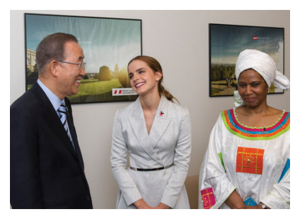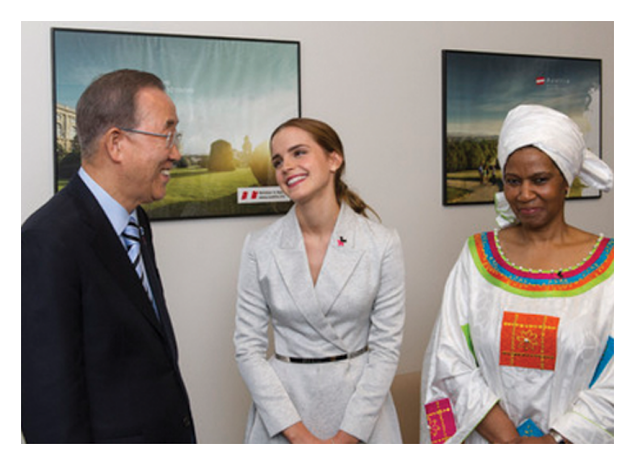
When Emma Watson delivered her impassioned speech at New York’s United Nations Headquarters on September 20th, it was unclear what exactly the repercussions would be. Feminism is by no means a new topic, however it has received new waves of attention in recent years, spinning in forceful circles from high-level officials, to mass media, to angered high schoolers and back again. In this process, some feel the topic has lost its spark, and now hangs as a dry, overly-disseminated point of contention and nothing more.
Watson, the recently named U.N. Goodwill Ambassador for Women, addressed the necessity of feminism in a slightly different manner, intending to ignite the cause’s spark by speaking humbly but boldly as a young woman with something personal at stake. Her candidness has been applauded around the world, especially by the girls – and boys – who grew up admiring the brilliant and brave “Hermione Granger” from Harry Potter.
Watson began her speech by grappling with what the term feminism actually means – a constant misconception in today’s debate that has harmed the cause and isolated its supporters. She explained that “feminism by definition is the belief that men and women should have equal rights and opportunities. It is the theory of political, economic and social equality of the sexes.” She then added frankly that: “I decided I was a feminist and this seemed uncomplicated to me. But my recent research has shown me that feminism has become an unpopular word. Apparently I am among the ranks of women whose expressions are seen as too strong, too aggressive, isolating, anti-men and unattractive.”
As counter-movements such as the Why I Don’t Need Feminism cause illustrate, feminism has become synonymous with “aggression” and the “anti-men” mentality that Watson described. Surely women who demand their own rights must be looking to deny men of theirs. Surely women who have been catcalled and paid less and overlooked at work must want to lash out. Such flawed logic assumes that anger rather than cooperation will prevail.
Watson described the irrational destruction such flawed logic will inevitably cause. To immense applause she vocalized a belief many feel should be held as common sense: that “it is time… we all see gender as a spectrum instead of two sets of opposing ideals.” Taylor Wynn ‘15 agrees, adding that “we need to involve both men and women [in the conversation of feminism] because it’s not just a woman’s fight and you need both genders to make it happen.”
To accomplish this, Watson is beginning the HeForShe campaign, encouraging “men to take up this mantle so that their daughters, sisters and mothers can be free from prejudice, but also so that their sons have permission to be vulnerable and human, too, reclaiming those parts of themselves they abandoned, and in doing so, be a more true and complete version of themselves.”
In recognizing the dual responsibility for gender equality, Watson extended a “formal invitation” to all men to join in the discussion because, as she explained, “how can we affect change in the world when only half of it is invited or feel welcome to participate in the conversation?” Mckenzie Barnes, ‘15, shared that this was her favorite part of the speech, applauding Watson for “the way that she reached out to men so formally, eloquently and on a global scale.” Yet, this invitation has come under fire as it seems to suggest that the aversion of men to the movement stems from purposeful exclusion by women.
Media outlets like the Huffington Post, in a manner that some might call nitpicking, have analyzed the significance – or rather, insignificance – of HeForShe. For one, commentators point out that the movement has yet to move beyond a Twitter #hashtag. The campaign is also criticized for focusing on strict gender binaries; “he” and “she,” that many along the periphery of the feminist movement have attempted to redefine and expand.
Intersectionality, or the overlapping of various forms of oppression, is another consideration for Watson. The New York Post, among other outlets, has questioned how qualified Watson is to represent such a diverse movement as a young, white, well-off woman. From this background, many feel that it seems nearly impossible to speak to the wide range of obstacles faced by women from all around the world.
One must only return to the transcript of Watson’s speech to silence such concerns. In it, she preempted the criticism that she is too young and too privileged. More broadly, she answered the question of who she is, as a young actress, to so boldly address such an enormous topic. Watson answered with the haunting quote originally made famous by civil rights leader, Representative John Lewis: “if not me, then who? If not now, then when?”
For all the criticism, these questions stand as testaments to the necessity of action and the danger of the waiting bystander. It is unrealistic to believe that there will ever be a public figure that encapsulates the entire feminist cause. It is easy to slip into a position of complacency in expectation of such a grandiose figure.
In fact, according to Director of Social Action, Ms. Brownlee, what was most moving about Watson’s speech was that “she seemed so nervous.” Watson did not present herself as a prepped, political figure regurgitating a polished script for the 100th time. Her words were honest; her voice even trembled slightly — it was almost as if a friend had stepped up to the microphone and was speaking across the wide audienchttp://docs.google.com/a/stoneridgeschool.org/file/d/0BxuAUnW3il9-eEF3aUtYLXhPdkk/edite to you personally. For all the criticism over all the criteria not met, this barefaced candor and pure openness is certainly new and will hopefully bring the change so needed.

Leave a Reply